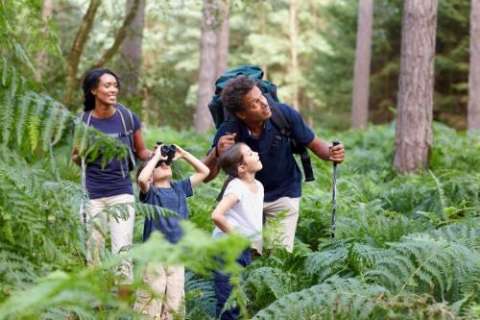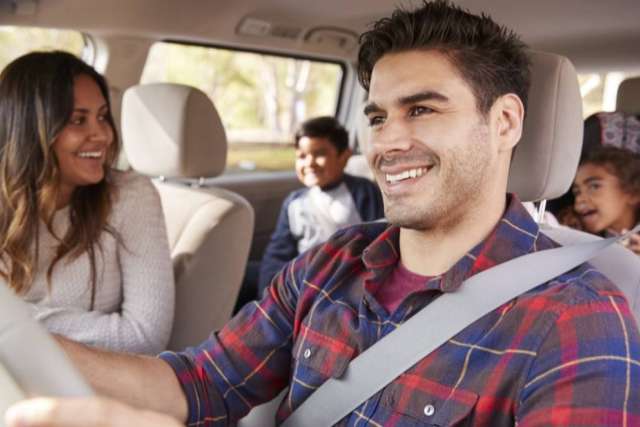Photo: A family road trip is one way to reduce risk of exposure to COVID-19 while traveling over the summer.
For many people, discussions of summer typically steer toward travel and vacation plans.
But what about this year, with COVID-19 still very much lurking and still making people sick even if they have been vaccinated or previously infected?
It is a personal choice, and one that should be made after people do their own risk assessments, said Shangxin Yang, PhD, a molecular biologist and clinical virologist with the David Geffen School of Medicine at UCLA.

“This COVID virus is definitely not going away anytime soon – it’s going to be with us for a while, and it’s going to keep coming in various waves of new variants,” said Dr. Yang, an assistant clinical professor in the department of pathology and laboratory medicine at UCLA. “We are just going to have to learn to live with this virus and do the best that we can to protect ourselves this summer when people want to travel and get back to family visits and traditions.”
Assessment of risk
Dr. Yang encourages people to focus on two critical factors when determining summer plans: personal susceptibility and the level of exposure risk from the type of travel they are considering.
Elderly people or those with compromised immune systems might want to consider safer travel plans, such as road trips by car, rather than risking the higher possibility of exposure on airplanes, buses and cruise ships.
“Those who are healthy and have strong immune systems might be comfortable with being in contact with other travelers in airports and on large airplanes, but immune-compromised people might want to avoid those kinds of risks,” said Dr. Yang.
He emphasizes that this summer is a great time for the classic road trip, for families or solo travelers.
“A family road trip is by far the safest way to travel, because you have all the control – about where you stop and how many people you come in contact with,” Dr. Yang said. “When you drive to nature destinations like our state and national parks, you can avoid close contact with crowds of people and spend more time outdoors. You can plan numerous trips like this and limit your levels of exposure.”
People with strong immune systems are more likely to risk traveling through airports, bus and train stations, and being in close proximity with other travelers. However, Dr. Yang strongly recommends wearing a mask on these trips, even for travelers who have been vaccinated or previously have contracted COVID-19.
“Of course, it is always a good idea for people to be wearing their mask in a crowded area. I definitely will wear one when I travel,” Dr. Yang said. “You only need one person shedding virus to spread it throughout a closed space like an airplane or a bus terminal. The longer you are in those closed spaces, the more your risk keeps increasing for infection from someone carrying the virus.”
Dr. Yang works closely with scientists in other countries to investigate and monitor infectious diseases around the world. Since people will be traveling a lot this summer, he and other experts expect that another wave of COVID-19 cases is likely.
He said health agencies have seen new waves of infections spiking about every six months, as the virus mutates into new variants and sub-variants, such as delta and omicron.
“Summer will likely have a small surge of infection cases, and then winter we expect will have a big surge,” as people spend more time indoors, Dr. Yang said. “This is expected to continue for a while, as this virus becomes a part of life.”
Cruises are the most risky
He said that while buses and trains are problematic for exposure because of new passengers getting on along the way, the worst travel risk is probably a cruise ship vacation, because of the close quarters.
“A lot of people are still really interested in going on cruises, but that is probably your greatest chance of exposure and infection,” Dr. Yang said. “It’s just so enclosed and crowded, and it’s not like you can wear a mask all the time.”
He said studies have shown that before COVID-19 vaccines were available, one person on a cruise ship could spread the virus to as many as 50% of others on the ship.
“That is the kind of trip that the elderly, or those with compromised immune systems, really should avoid,” he said. “A personal road trip is just a much better idea for anyone with a higher risk of infection and complications.”
Create a comfortable, safe travel plan
For any kind of trip that increases a person’s risk of exposure, Dr. Yang advises travelers to get their COVID-19 booster shot in advance.
“In the first four months after vaccination, it is very unlikely that you will get infected,” Dr. Yang said. “But your body can only hold that high level of antibodies for so long, so after four months we see that immunity continues to drop until your next booster shot.
“The booster shot will bump up your antibodies to a very high level,” he said. “So getting that shot before your summer trip is a really good idea.”
Ultimately, Dr. Yang advises limiting travel risk by being prepared with vaccines and masks.
“You want to make sure you have a travel plan that you are comfortable with, so that you will feel safer and can enjoy yourself,” he said.
“This is the new normal – we have to exist with this virus, so we just have to make sure we educate ourselves and make the best possible decisions.”
Get the latest information on COVID-19 and vaccines.
Tina Daunt is the author of this article.



